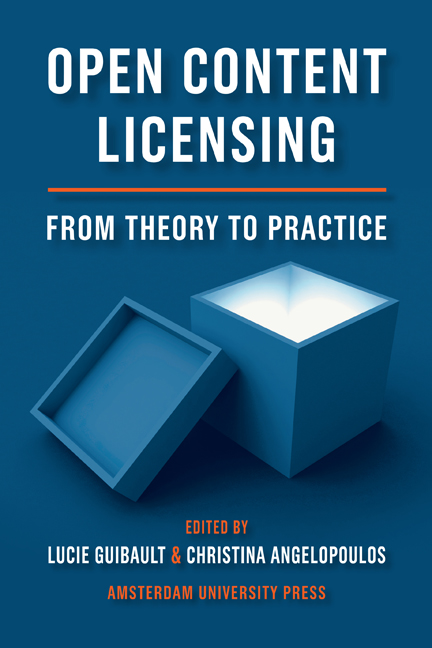Book contents
- Frontmatter
- Contents
- 1 Open Content Licensing: From Theory to Practice – An Introduction
- 2 Towards a New Social Contract: Free-Licensing into the Knowledge Commons
- 3 Is Open Content a Victim of its Own Success? Some Economic Thoughts on the Standardization of Licenses
- 4 (Re)introducing Formalities in Copyright as a Strategy for the Public Domain
- 5 User-Related Assets and Drawbacks of Open Content Licensing
- 6 Owning the Right to Open Up Access to Scientific Publications
- 7 Friends or Foes? Creative Commons, Freedom of Information Law and the European Union Framework for Reuse of Public Sector Information
- 8 Contributing to Conversational Copyright: Creative Commons Licenses and Cultural Heritage Institutions
- 9 Creative Commons and Related Rights in Sound Recordings: Are the Two Systems Compatible?
3 - Is Open Content a Victim of its Own Success? Some Economic Thoughts on the Standardization of Licenses
Published online by Cambridge University Press: 22 January 2021
- Frontmatter
- Contents
- 1 Open Content Licensing: From Theory to Practice – An Introduction
- 2 Towards a New Social Contract: Free-Licensing into the Knowledge Commons
- 3 Is Open Content a Victim of its Own Success? Some Economic Thoughts on the Standardization of Licenses
- 4 (Re)introducing Formalities in Copyright as a Strategy for the Public Domain
- 5 User-Related Assets and Drawbacks of Open Content Licensing
- 6 Owning the Right to Open Up Access to Scientific Publications
- 7 Friends or Foes? Creative Commons, Freedom of Information Law and the European Union Framework for Reuse of Public Sector Information
- 8 Contributing to Conversational Copyright: Creative Commons Licenses and Cultural Heritage Institutions
- 9 Creative Commons and Related Rights in Sound Recordings: Are the Two Systems Compatible?
Summary
Introduction
The renaissance of the commons is a widespread phenomenon across all sorts of creative fields, be it music, software, books, or films. Since open source licenses became a tool for software engineers to develop new methods of collaborative production of new code and to attack monopolies of software enterprises, the general idea of sharing and producing new content on this basis has also been adopted in other areas. One of these famous follow-ups of open source licenses is the Creative Commons movement, which offers different kind of licenses for the world of music, films or books and articles, all aiming at sharing content and some allowing for modifications of the original work. Other phenomena are obviously affirming the trend towards sharing and cooperative productions, such as the content offered on Wikipedia under the Creative Commons Attribution Share Alike Licence 3.0 or videos and music which are ‘mashed up’ on YouTube or other platforms. Even the European Union has decided to introduce its own model of a public license, the European Public Licence (EUPL).
However, doubts have been raised about whether these kinds of licenses are all necessary and if they cater to the specificities of a market sector or are, in fact, hampering the efficient sharing of productions. While most of these licenses have been conceived as an alternative to the limitations provided for in copyright acts, it may well prove to be the case that private ordering and licensing may not be a suitable alternative to these mandatory limitations in all circumstances. If licenses become too complex and hard to understand, they may fail to reach the goal of functioning as substitutes for the legal provisions that govern the sharing of works. Moreover, the success of licenses in encouraging new ways of producing and creating content depends on the incentives given to creators to make use of them. The interdependencies between market structures, licenses and incentives are obvious. Licenses are crucial for producing and creating content, comparable to the role of conditions of insurance for creating insurance products. In other words, licenses are part of the whole ‘content’ product and govern its attributes (such as its marketability, etc.).
- Type
- Chapter
- Information
- Open Content LicensingFrom Theory to Practice, pp. 51 - 74Publisher: Amsterdam University PressPrint publication year: 2012

